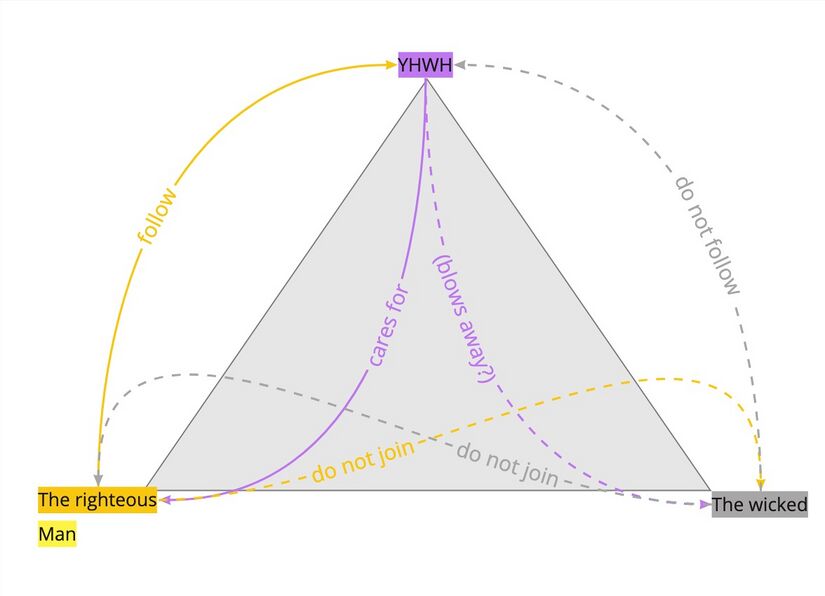Psalm 1 Participant Analysis
From Psalms: Layer by Layer
Psalm 1/Participant Analysis
Choose a PsalmNavigate Psalm 1
Participant Analysis
Participant Analysis focuses on the characters in the psalm and asks, “Who are the main participants (or characters) in this psalm, and what are they saying or doing? It is often helpful for understanding literary structure, speaker identification, etc.
For a detailed explanation of our method, see the Participant Analysis Creator Guidelines.
There are 3 participants/characters in Psalm 1:
Profile List
| The one |
| Tree |
| Righteous people |
| YHWH |
| Wicked people |
| Sinful people |
| Insolent people |
| Chaff |
Profile Notes
- The one is the hero of this psalm, the person being celebrated. He is celebrated for his rejection of wickedness (v. 1), his commitment to YHWH's instruction (v. 2), and for the fact that he will become like a tree in YHWH's life-giving garden (v. 3). "The one" is a literary representative for the group of righteous people mentioned in the end of the psalm (vv. 5-6). When Ps 1 is read as a unit together with Ps 2, the identity of "the one" converges with the identity of the anointed king in Ps 2. See The Identity of the Person in Psalm1:1 for details.
- YHWH, the God of Israel, is the ultimate source of the success of the righteous. He is the one who guides them (v. 2) and cares for them (v. 6a) throughout life's journey. The ambiguity in v. 3d also allows us to see YHWH as the one who "causes all that he does to flourish." See The Grammar of Psalm1:3d for details.
- The wicked (together with sinful people and insolent people) are the most mentioned participant in this psalm. (On the differences between these different terms for wicked people, see lexical semantics.) The wicked, unlike the righteous, have nothing to do with YHWH's instruction, and so they are like chaff and perish in the judgment.
| Speaker | Hebrew | Line | English | Addressee |
|---|---|---|---|---|
Psalmist |
אַ֥שְֽׁרֵי־הָאִ֗ישׁ אֲשֶׁ֤ר׀ לֹ֥א הָלַךְ֮ בַּעֲצַ֪ת רְשָׁ֫עִ֥ים | 1a | Happy is the one who has not walked in the counsel of wicked people, | Community |
| וּבְדֶ֣רֶךְ חַ֭טָּאִים לֹ֥א עָמָ֑ד | 1b | has not taken a stand in the way of sinful people, | ||
| וּבְמוֹשַׁ֥ב לֵ֝צִ֗ים לֹ֣א יָשָֽׁב׃ | 1c | and has not settled in the dwelling place of insolent people! | ||
| כִּ֤י אִ֥ם בְּתוֹרַ֥ת יְהוָ֗ה חֶ֫פְצ֥וֹ | 2a | Instead, his delight is in YHWH's instruction, | ||
| וּֽבְתוֹרָת֥וֹ יֶהְגֶּ֗ה יוֹמָ֥ם וָלָֽיְלָה׃ | 2b | and he meditates on his instruction day and night. | ||
| וְֽהָיָ֗ה כְּעֵץ֮ שָׁת֪וּל עַֽל־פַּלְגֵ֫י מָ֥יִם | 3a | And he will become like a tree transplanted beside water channels | ||
| אֲשֶׁ֤ר פִּרְי֨וֹ ׀ יִתֵּ֬ן בְּעִתּ֗וֹ | 3b | that gives its fruit in its season | ||
| וְעָלֵ֥הוּ לֹֽא־יִבּ֑וֹל | 3c | and whose leaves do not wither. | ||
| וְכֹ֖ל אֲשֶׁר־יַעֲשֶׂ֣ה יַצְלִֽיחַ׃ | 3d | And he will cause all that he does to flourish. | ||
| לֹא־כֵ֥ן הָרְשָׁעִ֑ים | 4a | Not so the wicked people! | ||
| כִּ֥י אִם־כַּ֝מֹּ֗ץ אֲֽשֶׁר־תִּדְּפֶ֥נּוּ רֽוּחַ׃ | 4b | Instead, they will be like chaff that the wind drives away. | ||
| עַל־כֵּ֤ן ׀ לֹא־יָקֻ֣מוּ רְ֭שָׁעִים בַּמִּשְׁפָּ֑ט | 5a | Therefore, wicked people will not stand firm in the judgment, | ||
| וְ֝חַטָּאִ֗ים בַּעֲדַ֥ת צַדִּיקִֽים׃ | 5b | and sinful people [will not stand] in the group of righteous people. | ||
| כִּֽי־יוֹדֵ֣עַ יְ֭הוָה דֶּ֣רֶךְ צַדִּיקִ֑ים | 6a | Because YHWH cares for the way of righteous people, | ||
| וְדֶ֖רֶךְ רְשָׁעִ֣ים תֹּאבֵֽד׃ | 6b | and the way of wicked people will come to an end. |
Notes
- vv. 1-3. On the identify of the one and his relation to the righteous, see The Identity of the Person in Psalm1:1.
- v. 2b. His instruction or his instruction? Some commentators think that the antecedent of the pronoun in the phrase "his instruction" (v. 2b) is the one rather than YHWH. Rashi, for example, writes, "At first it is called ' YHWH's instruction,' but after he has labored over it it is called his instruction" (מתחלה היא נקראת תורת י״י, ומשעמל בה היא נקראת תורתו). But the parallel between בְּתוֹרַת יְהוָה in v. 2a and בְתוֹרָתוֹ in v. 2b suggests that YHWH is the antecedent of the pronoun in the b-line.
- v. 3b. Its season or its season? The antecedent of the pronoun in the phrase "its season" (עִתּוֹ) is probably the fruit rather than the tree. Cf. Lev 26:4—וְנָתַתִּ֥י גִשְׁמֵיכֶ֖ם בְּעִתָּ֑ם.
- v. 3d. The one, the tree or YHWH? On the subject of the verbs in v. 3d, see The Grammar of Psalm1:3d.
Participant Relations Diagram
The relationships among the participants may be abstracted and summarized as follows:




